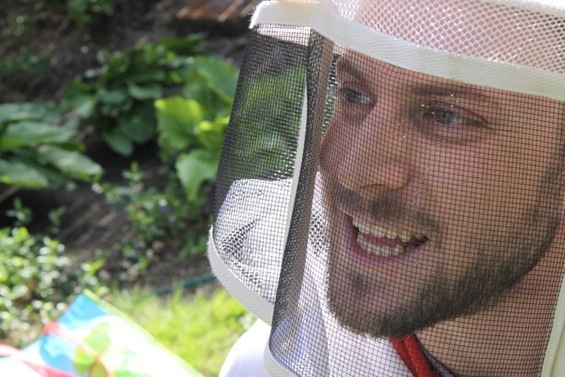Jews tend to think seriously about honey just once a year, at Rosh Hashanah. But Dr. Noah Wilson-Rich, a behavioral ecologist, beekeeper and the founder of Best Bees Company, pays attention to bees every day. I asked him about urban beekeeping, the benefits of honey and what’s been happening with all the disappearing bees.
So, how did you get into urban beekeeping?

Someone once told me the best thing I could do for my immune system was to use local honey. Can you explain what that meant, exactly?
Honey is very healthy for many reasons. One aspect of honey that helps allergy sufferers is the pollen found in local honey. The idea behind local honey benefiting allergy sufferers’ immune systems is that a spoonful throughout the year keeps the body’s exposure to pollen antigens up. In response, the ratio of antibody levels to allergens remains high, and spring-time pollen exposure can be handled more easily, rather than having an all-out allergy attack.
In the past few years, bee colonies have been dying off mysteriously. Do we know why, and what does it mean for the environment?
Colony Collapse Disorder remains a mysterious phenomenon by which adult honey bees disappear; no dead bodies are found! Three leading hypotheses for what is causing this are: 1) poor nutrition due to habitat loss and fewer flowers, 2) pesticides, and 3) disease. Research papers supporting the latter two hypotheses have been published recently, but the global scientific community has yet to reach a consensus on an explanation.
It’s nearly Rosh Hashanah, and honey plays a big part in the Jewish New Year ritual. Do you see an uptick in business around this time of year?
Rosh Hashanah is one of my favorite times of the year. I look forward to visiting my family in Brooklyn and surrounding areas. We at Best Bees sell the actual honey bees, with full management services included. Our main sales season peaks in the late winter. One of our terrific clients is Follow the Honey (1132 Massachusetts Ave., Cambridge). They sell honey from around the world, including from Israel! They are the premier place to pick up the best honey for Rosh Hashanah.


